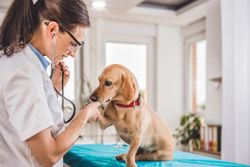
Lyme disease is a tick-borne illness that can cause symptoms such as loss of appetite, fever, and extreme fatigue in humans, and unfortunately, in dogs as well. While Lyme disease can be successfully treated with antibiotics, it is easier to avoid this potentially dangerous disease altogether. Below is a little more information about how dogs typically contract Lyme Disease, how it could impact them, and how your veterinarian can help.
Can Canines Get Lyme Disease?
Like humans, dogs can contract Lyme Disease from ticks who have been attached from 24 to 48 hours. Ticks are typically found in tall grasses, sagebrush, and wooded areas, which dogs may frequent. Ticks crawl instead of fly but can wait on the tips of vegetation until an animal or person walks by. Since ticks are very small at first, they often go unnoticed, especially when they are under the fur of a dog’s coat.
Unfortunately, once dogs have contracted the disease, they may struggle with their appetite, sleeping patterns, or joints. The disease can cause extreme joint pain, discomfort, and stiffness, making it difficult for your animal to move like they normally would.
Dogs can be tested for Lyme Disease at your veterinarian’s office using a C6 Test and Quant C6 test. The C6 test is performed first to check for an active Lyme infection, and then a Quant C6 test is necessary for the veterinarian to decide whether or not antibiotic treatment would help.
How Can You Prevent It?
 You can prevent Lyme Disease in your dogs by avoiding the areas where ticks reside. When you hike, stick to main trails and encourage your dog to do the same. Always check your animal carefully for ticks after you are outside in wooded areas. If you spot a tick, remove it as soon as possible, or refer to your veterinarian for help. Keep your animal as healthy as possible by encouraging a healthy diet, regular exercise, and by providing careful grooming.
You can prevent Lyme Disease in your dogs by avoiding the areas where ticks reside. When you hike, stick to main trails and encourage your dog to do the same. Always check your animal carefully for ticks after you are outside in wooded areas. If you spot a tick, remove it as soon as possible, or refer to your veterinarian for help. Keep your animal as healthy as possible by encouraging a healthy diet, regular exercise, and by providing careful grooming.
Anytime you suspect any health problems in your animal, it is important to turn to High Point Veterinary Hospital for help. With more than 20 years of experience, these professionals can help with every step, from bathing, boarding, and grooming to medical work-ups and examinations. To find out more about how they can help your furry friends, visit their website, or give their office a call at (336) 889-3832.
About the Business
Have a question? Ask the experts!
Send your question

